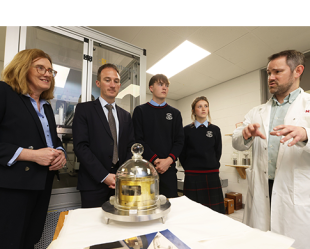The National Standards Authority of Ireland (NSAI) has developed and published a new National Standard Recommendation for the design and installation of Heat Pumps in homes.
This new Standard Recommendation is one of a suite of measures developed by NSAI in direct response to actions set out in the Climate Action Plan 2019, the framework that sets out how Ireland will achieve its ambitious decarbonisation targets.
Implementing this new Standard Recommendation will support the installation of 600,000 heat pumps in homes that are already suitable for the technology by 2030. These targets are set out in the Programme for Government.
NSAI CEO Geraldine Larkin said: “I am very pleased we have published this new National Standard Recommendation for the design and installation of Heat Pumps in homes. NSAI is playing its part to drive down carbon emissions by supporting actions on the supply chain for renewables, retrofitting homes and climate adaptation.
“NSAI are working across different sectors providing environmental standards helping large companies and SMEs minimize their environmental footprint.
“We will continue to deliver Standards that ensure that sound environmental practices are ingrained as best practice as Ireland transitions to a more circular economy.”
Damien English, Minister of State for Business, Employment and Retail said: “I am delighted to support the NSAI in the launch of its new standard on heat pumps for homes in Ireland. It is incumbent on all organisations - public and private – to work towards achieving Ireland’s goal to reduce its CO2 emissions by 2030.
“NSAI is playing its part with this new standard which will help public and private homes make the change to cleaner and more sustainable heating systems, and with a knock-on effect of new job opportunities for those businesses in retrofitting works.”
The Standard Recommendation (S.R. 50-4:2021) concentrates on the types of heat pump that are installed in homes to provide heating and hot water and provides guidelines for the design, installation, commissioning, and maintenance of heat pump systems.
In 2018 the average dwelling emitted 5.2 tonnes of energy-related CO2. 66% of this was from direct fuel use in the home. The sector must reduce its CO2 eq. emissions significantly to meet 2030 emissions reduction targets.
Media Enquiries
For NSAI media enquiries please contact John Parsons, PR Account Manager.
e: john.parsons@nsai.ie
Notes to Editor
This document (S.R. 50-4:2021) is a Standard Recommendation and has been prepared by the National Standards Authority of Ireland Technical Committee 31: Building services, Sub-committee 6, Heat pumps.
Heat pumps work differently from traditional heat sources such as boilers, which generate heat by combusting fuel (e.g. natural gas, oil, LPG etc). Heat pumps are like refrigerators and air conditioning systems: they use a refrigerant cycle to extract low-grade heat (usually under 25 °C) and upgrade it to higher grade heat, i.e. at a higher temperature at which it is useful. Heat pumps move heat, hence the name heat pump.
This is the first edition of S.R. 50-4 and forms part of the S.R. 50 series of Standard Recommendations for building services. The series consists of the following parts:
- Part 1: Water based heating systems in dwellings,
- Part 2: Thermal solar systems,
- Part 3: Water supply for domestic use within dwellings and their curtilages,
- Part 4: Heat pump systems in dwellings.
About NSAI:
NSAI (National Standards Authority of Ireland) is Ireland’s official standards body. It is responsible for standardization, conformity assessment and measurement. Where a standard already exists, NSAI works with organisations and businesses to help them apply it. Where a standard may be needed, NSAI will work with relevant parties at national or international level to create and develop the appropriate standard. NSAI improves the performance of organisations and protects consumers through the setting of standards and issuing of certification in the quality and safety of goods and services.
[Disclaimer: All reasonable effort was made to ensure that the information on this page was correct at the time of publication. Any views or opinions expressed on this page are not necessarily those of NSAI. NSAI accepts no responsibility or liability howsoever arising from the contents of this publication or any errors, inaccuracies, or omissions in the contents of the information provided therein.]



